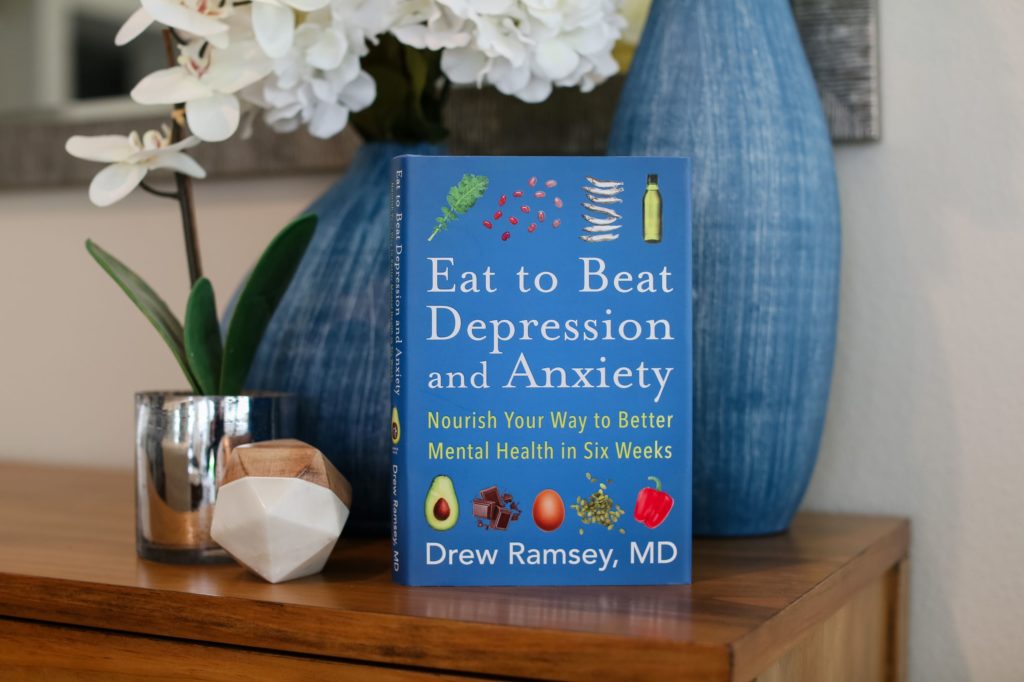May is mental health awareness month.
And I am diving into the ‘Eat to Beat Depression & Anxiety’ book by @drewramseymd to understand further how nutritious foods can positively impact mental health.

I think Hippocrates was on to something when he said, “Let thy food be thy medicine and medicine be thy food”.
Westernized medicine has traditionally been focused on therapy and prescription medicine. But what about food? Food has a significant impact on mental health. Studies are showing that there is a clear relationship between food and mental health. For example, high-fat and sugar foods can alter parts of the brain and impact memory, learning, and attention (Reichelt et al., 2017). Other studies are showing how high nutritious foods positively increase attention capacity (Henriksson et al., 2017).
I am passionate about how we can incorporate nutrition when treating mental health. Not only will it optimize for brain health, but gut health is also important.
Mental Health America (2021) recently shared statistics regarding our country’s current mental health state. Unfortunately, the numbers have been increasing year over year. The COVID-19 pandemic has exacerbated mental health among adults and youth.
Here are some of the staggering statistics:
- About 1 out of 4 people will be diagnosed with a mental health illness
- Only 1 out of 3 people seek treatment
- 7% of youth have a severe major depression
- 8% of Americans with mental health illness are uninsured
Why does this matter? Mental illness not only impacts the quality of life but can also increase healthcare expenses due to an increase in out-of-pocket spending or more doctor visits.
Dr. Felice Jacka (2015) conducted a great interview discussing lifestyle factors that can prevent mental health disorders. She shares how unhealthy foods can worse mental health outcomes. The evidence is becoming clearer in showing the relationship between and nutrition and mental health throughout an individual’s lifetime. Foods known as “junk foods” not only impact the brain but also contribute to inflammation.
“What we see is there is a negative impact of poor diet on the brain and brain function.” – Dr. Felice Jacka
In Dr. Ramsey’s book, he does a great job at breaking down the nutrients that support brain health, sharing personal experiences, references research studies, optimizing gut health, and has some amazing recipes.
I’ve got my eye on the Chocolate Peanut Butter Cup Smoothie recipe, also known as the healthy brain smoothie.
Check out Dr. Ramsey’s book and find some great brain health recipes for you. Or my ideas on minimizing Brain Shrinkage for improving quality of life.
With gratitude,
Tara
References:
Henriksson, P., Cuenca-García, M., Labayen, I., Esteban-Cornejo, I., Henriksson, H., Kersting, M., Vanhelst, J., Widhalm, K., Gottrand, F., Moreno, L. A., & Ortega, F. B. (2017). Diet quality and attention capacity in European adolescents: The healthy lifestyle in Europe by nutrition in adolescence (HELENA) study. The British Journal of Nutrition, 117(11), 1587–1595. https://doi.org/10.1017/S0007114517001441
Jacka, F. N. (2015). Lifestyle factors in preventing mental health disorders: An interview with felice jacka. BMC Medicine, 13.
Mental Health America. (2021). The state of mental health in America. Retrieved from https://www.mhanational.org/issues/state-mental-health-america
Reichelt, A. C., Westbrook, R. F., & Morris, M. J. (2017). Editorial: Impact of Diet on Learning, Memory and Cognition. Frontiers in Behavioral Neuroscience, 11, 96. https://doi.org/10.3389/fnbeh.2017.00096